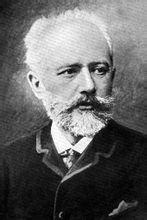(单词翻译:单击)

俄罗斯浪漫乐派作曲家柴可夫斯基(1840-1893)可说是全世界最受欢迎的古典作曲家。他的音乐具有强烈的感染力,充满激情,乐章抒情又华丽,并带有强烈的管弦乐风格。然而这些都反映出作曲家极端情绪化、忧郁敏感的性格特征——会突然萎靡不振,又会突然充满乐观精神。 柴可夫斯基的一生几乎可以用来拍摄一部好莱坞电影——他与导师安东·鲁宾斯坦关系紧张;与崇拜者的一段错误的婚姻令他精神崩溃并试图自杀;他与资助人梅克夫人在13年里只通信而未曾见面,还有他的同性恋倾向……种种经历加上敏感脆弱的性格令他过早地衰老。五十岁的他已经白发苍苍,步履蹒跚。可以说,柴可夫斯基的生活是不快乐的,他的一生深受压抑和神经衰弱的折磨。不过也许正因为如此,他才会将所有的情绪都倾注到音乐当中。
Pyotr Ilyich Tchaikovsky was born to a fairly wealthy middle class family. His father, Ilya Petrovich married Alexandra and the two had two sons, Pyotr and Modest. Pyotr was a 1)precocious child, having learned to read French and German by the age of six. A year later, he was writing French 2)verses. The family hired a 3)governess to keep watch over the children, and she often 4)referred to Tchaikovsky as the “5)porcelain child.” Tchaikovsky was very 6)sensitive to music and was placed into piano lessons at a young age. He would complain at night that the music in his head would not let him sleep.
彼得·伊里奇·柴可夫斯基出生于一个颇为富有的中产家庭。他的父亲伊利亚·彼得罗维奇娶了亚历山德拉,两人育有两子——彼得和莫杰斯特。彼得是一个早熟的孩子,六岁时就能够读法语和德语。一年后,他已经可以用法语写诗。家里请了一位家庭教师看管孩子,她常常称柴可夫斯基为“瓷器做的孩子”。柴可夫斯基对音乐十分敏感,小小年纪就被安排去上钢琴课。他常在晚上抱怨说脑中的音乐让他无法入睡。
When Tchaikovsky was ten years old, his family 7)enrolled him into the School of 8)Jurisprudence for a career in 9)civil service, not fully 10)comprehending his remarkable musical talent. Because the minimum acceptance age was 12, he was sent to 11)boarding school. After turning 12, he entered into the senior classes at the school. Apart from singing in 12)choir, he did not seriously study music. It wasn’t until after he graduated in 1859 that he began to study music. In 1862, Tchaikovsky began taking classes with Nikolai Zaremba at the St. Petersburg 13)Conservatory. In 1863, Tchaikovsky quit his job as clerk at the Ministry of Justice.
在柴可夫斯基十岁那年,家人将他送到法学院学习,以便日后从事公务员的工作——他们没有意识到他的音乐天赋有多惊人。由于入读的最小年龄是12岁,于是他被送到寄宿学校。满12岁后,他进入了学校的高年班。除了在唱诗班唱歌以外,他没有进行正规的音乐学习。在1859年毕业后,他才开始学习音乐。1862年起,柴可夫斯基在圣彼得堡音乐学院跟随尼古拉?扎连芭学习。1863年,柴可夫斯基辞去了在司法部的书记工作。
After quitting his job, Tchaikovsky devoted his life to music. Under the 14)mentorship of Anton Rubinstein (director of the conservatory), Tchaikovsky went through the conservatory’s 15)curriculum.
辞职后,柴可夫斯基全心全意地投入到音乐当中。在安东?鲁宾斯坦(音乐学院院长)的指导下,柴可夫斯基完成了学院的课程。
Aside from musical studies, he also studied conducting. Tchaikovsky had an 16)immense fear of it and would often hold his chin with his left hand while conducting after once imagining his head falling off his shoulders. Though he was not the best conductor, he was one of the best music students. In 1866, Tchaikovsky took a job as a 17)harmony teacher for the Moscow Conservatory with Rubenstein’s 18)recommendation.
除了学习音乐,他还学习指挥。柴可夫斯基对指挥有着极大的恐惧。有一次他想象着自己的头从肩上掉下来,此后他在指挥时常常用左手托住下巴。虽然他不是最优秀的指挥家,但依然是音乐系最好的学生之一。1866年,在鲁宾斯坦的推荐下,柴可夫斯基接受了莫斯科音乐学院和声教授一职。
In 1868, he had a brief 19)flirtation with 20)soprano Desiree Artot, but she later married a Spanish 21)baritone. Though his personal life may have been unsuccessful, Tchaikovsky was steadily completing composition after composition. In 1875, Tchaikovsky’s world 22)premiere of his third 23)symphony was given in Boston on October 25th and was conducted by Hans von Bulow. Despite there being pockets of opposition towards his music, his works and 24)reputation began to spread across Europe.
1968年,他与女高音狄希耶·雅朵有过一段短暂的罗曼史,但她后来嫁给了一名西班牙男中音。尽管个人生活不太如意,柴可夫斯基还是创作出一首又一首的作品。1875年10月25日,柴可夫斯基的第三号交响曲在波士顿进行全球首演,由汉斯·冯·比洛指挥。尽管有一小撮人对他的音乐表示反感,他的作品和名声开始席卷欧洲。
In 1877, Tchaikovsky married Antonina Miliukova, his former student at the conservatory who declared her love for him. It has been suggested that she reminded him of Tatiana, a character in his opera Eugene Onegin. But the marriage failed after a few months with Tchaikovsky unable to return his wife’s 25)affection. He was very 26)distraught and even tried to drown himself in the river.
1877年,柴可夫斯基迎娶了安东妮雅·米露可娃。她以前是柴可夫斯基在音乐学院的学生,曾经对他示爱。据说她令柴可夫斯基想到其歌剧《叶甫盖尼·奥涅金》里面的一个角色——塔季扬娜。然而几个月后,这段婚姻以失败告终,因为柴可夫斯基无法回应妻子的爱。思绪烦乱的柴可夫斯基甚至试图投河自杀。
During the same year of his disastrous marriage, Tchaikovsky also entered into another relationship—only instead of meeting face to face, they communicated through letters. This worked out very well for him given his extreme shyness. The woman was Nadezhda von Meck. Though it is unclear why she did not want to meet him, she sent him money as she greatly admired his work. They exchanged well over 1,000 letters between 1877 and 1890. In these letters, Tchaikovsky was more open about much of his life and his creative 27)processes than he had been to any other person.
在这段不幸的婚姻的同一年,柴可夫斯基还发展了另一段关系——只是他们并没有见面,而是通过书信来往。鉴于他极度羞涩,这种方式很适合他。这名对象是娜蒂契达·冯·梅克。虽然人们不大清楚她为何不想跟他见面,但由于她十分推崇柴可夫斯基的作品,她不断给他寄钱。在1877年至1890年间,他们的通信多达一千多封。在这些信件中,柴可夫斯基能够更加随意地讨论自己的生活和创作过程,他对其他人从未如此坦诚。
Despite what it seemed on the outside, inside Tchaikovsky was emotionally troubled, weeping and doubting himself very often, and took to alcohol as a form of relief.
尽管外表光鲜,其实柴可夫斯基的内心备受情感的折磨,经常痛苦流泪,并质疑自己,还会借酒消愁。
After enjoying numerous successes and frequent travels, Tchaikovsky’s money and letters from Meck came to a 28)halt. In 1890, she claimed to be broke, though that wasn’t the case. It wasn’t the loss of the money that had greatly upset him, it was the sudden 29)termination of his emotional 30)companion of 13 years. This was a 31)blow for the already emotionally sensitive composer.
柴可夫斯基享受了成功的滋味,经常出行表演,后来梅克夫人的钱和信都终止了。1890年,她声称破产,虽然事实并非如此。金钱的损失不是问题,令他伤心欲绝的是突然失去相伴了13的情感伴侣。这对原本就情感脆弱的作曲家来说是一次打击。
Throughout Tchaikovsky’s last years, he was continually 32)plagued by anxiety and depression.
纵观柴可夫斯基的晚年,焦虑和抑郁一直令他备受折磨。
Though there are many rumors about Tchaikovsky’s cause of death, the most widely accepted explanation is that he died of 33)cholera after drinking a glass of water that wasn’t boiled. He died nine days after the premiere of his Sixth Symphony, the Pathétique.
虽然关于柴可夫斯基的死因有很多传言,但最被广泛接受的解释是他在喝了没烧过的水后死于霍乱。柴可夫斯基在其第六交响曲——《悲怆》首演的九天后去世。


